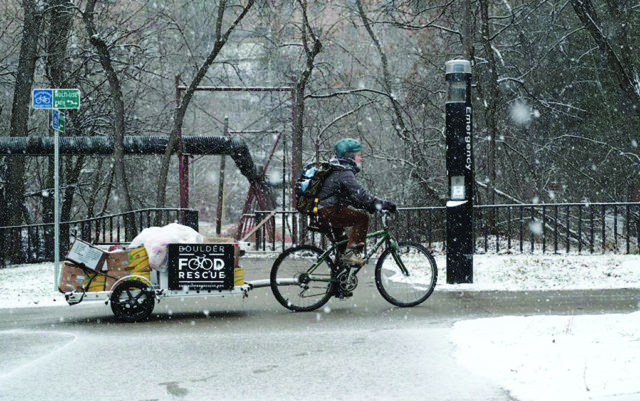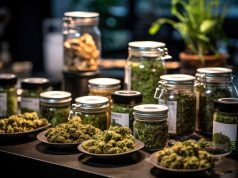
We all love those prized Palisade peaches that are so easily devoured, crate after crate, at the end of summer every year. But did you know that one out of four peaches doesn’t even make it out of the orchard? Or that after 253 miles of transporting them to Boulder County (about 10 gallons of gas per truck, round-trip), there’s no guarantee that any particular peach will even hit the shelf before it’s discarded to make room for the next day’s shipment? If the peach bruises or over-ripens in your kitchen, do you know what your options are, besides (God forbid) the trash?
Thankfully, Boulder is home to a slew of proactive efforts dedicated to save foods like the very peaches we love (and tons of other produce) to create an overall better environment and community for future generations. Jamie Harkins, sustainability coordinator for the City of Boulder, says decreasing food waste is increasing in priority for the local government. By updating the City’s Climate Commitment and Action Plan, continuing educational projects and expanding the Food Waste Awareness Week program this September, things are looking bright on Boulder’s food waste reduction horizon.
But locals are also leading the charge: Here are three Boulder County organizations and businesses helping the City reach its zero waste goals.
Boulder Food Rescue
In 2011, Hayden Dansky kick-started a food recovery program named Boulder Food Rescue, which bridges the gap between problems in Boulder’s food infrastructure and food insecurity. “There’s food waste on all levels,” Dansky says — the farm, transportation sectors, distribution systems, grocery stores and, ultimately, consumers, who contribute 60 percent of overall food wasted, according to the 2016 City of Boulder Food Waste Audit. Dansky, who is the program’s executive director, endorses the EPA’s Food Recovery Hierarchy, which pinpoints “source reduction” and “feed hungry people” as the top two prerogatives when it comes to managing a more sustainable food system. After finding out that 40 percent of food produced ends up in a landfill, Dansky began to reach out to grocery stores and restaurants to see if businesses would donate any excess produce. Grocery stores such as Sprouts, Lucky’s and Whole Foods now participate in the program, resulting in 1,200 pounds of produce that’s redistributed to low-income communities every day. These businesses benefit by reducing trash collector fees and receiving an incentivized federal tax credit, and the community benefits from the nourishment.
Looking ahead, Boulder Food Rescue plans to create a more engaging environment for the people they serve by sharing the community’s stories about food insecurity. They also plan to continue educating businesses about food donation policies and working with the City of Boulder to develop strategies to reduce even more local food waste.
Eco-Cycle
In the summer of 2015, the City of Boulder, along with the green minds behind Eco-Cycle, passed the Universal Zero Waste Ordinance that requires all restaurants, businesses and schools to reduce waste by recycling and composting. Eco-Cycle has been in the pro-environmental game since 1976 — when founders Roy Young and Pete Grogan started to collect recyclables on an old school bus — and the organization has helped create recycling facilities and conduct research programs for Boulder County ever since. Nowadays, Eco-Cycle focuses on educating the community about composting and how they can dispose of organic waste both curbside and in their own backyards.
Communications Director Harlin Savage says businesses have many questions and obstacles to address when first learning about the logistics of composting, such as space constraints, but the long-term benefits to composting have sparked interest in working beyond these hurdles. Composted soil adds nutrients to the land, it’s more resistant to erosion and grows plentiful produce. “By diverting waste, it prevents methane gas’ heat trapping power,” Savage adds, a toxic emission that is many times more powerful than carbon dioxide.
In the next 11 years, Eco-Cycle envisions Boulder achieving their zero-waste milestone and continuing intensive compost research within the county.
The Stone Cup
The Town of Lyons has committed to becoming a zero-waste community and The Stone Cup’s owner Mindy Tallent is fully on board. While it’s a costly practice for the restaurant and a continual process of educating customers, Tallent says it’s worth it because the country’s astronomical food waste needs to be addressed. Within her shop, Tallent uses ceramic ware and stainless steel silverware for dine-in guests and compostable to-go containers. Customers are encouraged to bring in their own mugs. She also use an in-house composting and recycling program through Eco-Cycle.
The Stone Cup hopes the current government will address climate change and pass legislation that causes change in manufacturing, production and purchasing so it will be more affordable to be environmentally responsible. “Our hope is that folks become more educated about how our environment is impacted by our decisions and actions,” Tallent says. “As business owners, we will continue to do what we can in educating [others] and leading by example.”














